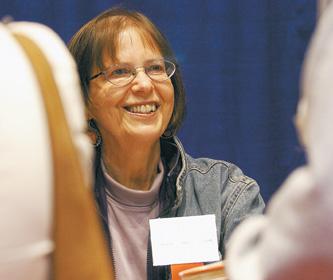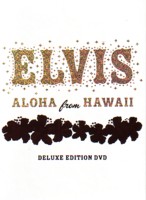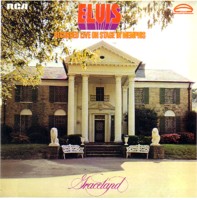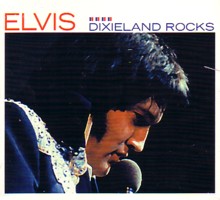Redefining
Elvis
KENTUCKIANS
WORK KICKS OFF OUR BOOK CLUB By Cheryl Truman HERALD-LEADER
BOOKS EDITOR
"There's
nobody like Elvis. He gave us that. I think he would have
been better off if he didn't." — Bobbie Ann Mason, author
of Elvis Presley
| One
of the things about Elvis that struck Bobbie Ann Mason
was the first home he bought for his parents, a ranch
house on Audubon Avenue in Memphis. The family was poor,
acted poor, felt poor. But suddenly they lived in a house
with all the space, comforts and conveniences of those
who had made it in '50s America -- such as twin state-of-the-art
wall ovens, two tiled bathrooms and Danish modern furniture.
The Presleys were stunned. |
 |
"I
can feel what it was like for them to go into a comfortable
house with a nice kitchen and a nice neighborhood," Mason
says. "His parents didn't know what to do with themselves."
Mason
suspects it was the emotional pinnacle of Elvis' life. "That
story is about innocence and about things going downhill then."
In a career marked by dramatic extremes, she thinks, Elvis
was never to have that same feeling again.
Mason's
book, one of the Penguin Lives series (Viking Books, $19.95),
isn't an exhaustive tell-all. Rather, it's about defining
moments in Elvis' brief life. "I tried to portray these things
not in terms of ideas or conclusions you could draw, but more
in terms of emotions and the textures of his emotions. ...
In each chapter, I try to get at a certain moment that draws
together a lot of experience.
"I
didn't write about what Elvis did to us. I wrote about what
we did to Elvis, how did he experience his fame." She sympathizes
with the pressure of a very mortal man trying to simultaneously
define and live up to the Elvis legend.
Elvis
was, Mason notes, simultaneously delighted and haunted by
his own popularity, asking himself whether he was a godlike
figure or possibly even another Christ. And then, after Elvis'
death in 1977 at age 42, his fall from grace was just as dramatic.
He was savaged.
"After
his death, everybody blamed him -- for being poor, country,
for singing black songs," Mason said. "People even thought
he was odd because he was devoted to his parents. So he ends
up being a caricature." Mason thinks that's unfair to Elvis'
complexity, his constant attempts to reinvent himself even
in the face of opposition from his family and assorted hangers-on
at his attempts to expand his artistic horizons.
Elvis
got tired of being Elvis, but he loved being Elvis. His reading
was guided by a hairdresser, then stymied by his wife. He
was devoted to his mother yet all too aware of all the things
she thought he couldn't do.
One
photo that strikes Mason is of the Presley family in Germany
during Elvis' stint in the Army. Elvis' mother, Gladys, had
recently died, and the Presley family is gathered for breakfast
-- in a strange country, without the family anchor, trying
to re-create a down-home breakfast complete with McCormick's
pepper in its signature can.
Despite
Elvis' loyalty to some of his poor rural ways, he nonetheless
nurtured "a sense of cultural inferiority" that limited his
career: Not expanding his musical style to include "highbrow"
elements. Not taking riskier parts in movies such as Midnight
Cowboy instead of the pap formula films that are now almost
unwatchable. Mason used to think Elvis had a weak character.
Now she doesn't.
"I
think he was struggling heroically to deal with everything
that had been handed him. ... He tried to live up to the image,
and that proved impossible." She's also touched by Elvis'
attempts to educate himself, "in his own way, he's trying
to expand his horizons and learn." But he has no guide among
his cronies, and his reading veers into strange metaphysical
directions.
Wife
Priscilla initiates a book bonfire. And Priscilla is not the
only one at odds with Elvis' strivings. Mason says his manager,
Colonel Parker, had "no aesthetic sense ... no interest in
Elvis' artistic inclinations, his genius in shaping and interpreting
a song."
Still,
Mason says, "my understanding of Parker and the Presley family
is that they were made for each other." Parker was "a familiar
type of person" to the Presley family, "a Southern trader."
That Parker had little real taste and no expertise for re-inventing
Elvis in artistically riskier ways apparently never bothered
the family.
Still,
Elvis left a legacy: The Elvis songs sung in that Elvis style,
a driving mix of blues, gospel and rock 'n' roll that would
never be duplicated.
"He
was driven to make music," Mason said.
"He
had it in every nerve of his body."
(Spotlight/Article,
Source: MiamiHerald.com)
|







